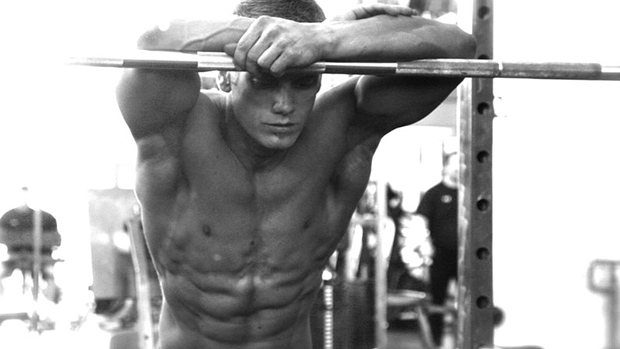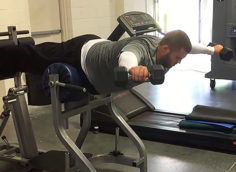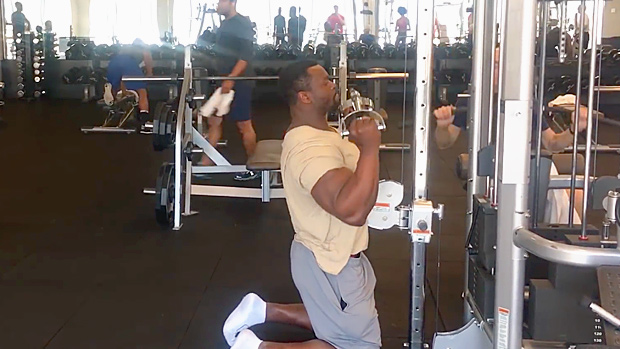If you want to be strong, jacked, AND aerobically fit, I have some good news for you: You can skip the 10-mile runs and day-long bike rides. In fact, you can avoid "endurance" training altogether if you want.
High-intensity interval training (HIIT), or short intense sprints performed at max effort, is all you really need.
There's something to be said about being strong, functional, and fit. What's "fit" exactly? It means you can get more work done in 20 minutes than most people can do in an hour. It's work capacity.
Training specificity matters, so always train according to your goals. If your goal is to run a marathon, you better spend 10-14 hours per week doing mind-numbing, low-intensity steady state (LISS) cardio. Sheer volume is the only way you're going to build the aerobic base needed to complete a marathon.
But if your goal is to be strong, muscular, and aerobically fit, then keep your conditioning short and intense.
Now, is endurance training superior to HIIT for building elite aerobic capacity and maximizing aerobic function? Absolutely. Is endurance training great to maintain all the hard-earned strength and muscle you've built in the gym? Absolutely not.
When doing any form of LISS cardio you're literally sending your body the wrong signal for preserving muscle and strength. Muscle tissue is heavy. It has a high nutrient demand, a high water demand, and a very high oxygen demand.
Your body adapts to whatever stimulus you provide it, so if you require your body to do a significant amount of cardio, it will drop the muscle to compensate for the increased demand on the cardio-respiratory system.
But HIIT is the form of cardiovascular training that improves VO2 max and aerobic capacity while allowing you to maintain strength and muscle. Plus, short sprints performed at maximum intensity improve metabolic rate. With LISS, calorie burning stops when the session stops. With HIIT, you burn calories during the session and continue to burn calories all day long.
Not only does HIIT save time, you get a much better return on your cardio investment. Done correctly, HIIT can even build muscle. Ever seen the legs of a velodrome cyclist?

So why is aerobic capacity important if you want to get and stay jacked? Simply put, it increases your work capacity – your ability to perform a set amount of work in a certain time domain.
Improved aerobic capacity allows you to better control your heart rate and recover more quickly between sets when lifting. In turn, this improved aerobic capacity allows you to get more work done in your training session.
HIIT, when programmed intelligently, improves aerobic capacity while preserving lean body mass and strength. It may even be the missing link in your training that will ultimately allow you to get bigger and stronger.
It's as simple as this:
- Improved aerobic capacity = improved work capacity.
- Improved work capacity = more work done in your workout.
- More work done in your workout = more strength/muscle gains.
HIIT is most effective on non-lifting days or done in separate training sessions if you can train twice per day. HIIT workouts are best performed once or twice per week. My favorites:
HIIT Workout 1
Every 3 minutes x 6 rounds: 10-20 second max-effort sprint on the Assault bike or running track. Rest and recover for the remainder of each 3-minute round.
HIIT Workout 2
Power intervals performed on a Concept 2 rower: 5 rounds of 60 second max distance row for meters.
Rest 3-5 minutes between rounds. Focus on taking as many long, strong, powerful strokes as possible in the 60 seconds. Your entire body will be screaming by round 4 and 5 if you hit it with the appropriate intensity.
Your body will experience some extremely uncomfortable sensations with HIIT. You're forced out of your comfort zone and you'll feel like your body is swimming in a pool of lactic acid.
HIIT is hard, which is why you don't see more people doing it. But if you find LISS cardio incredibly boring and an inefficient use of your training time, HIIT is great.
Embrace the discomfort. It's the only way you'll get better.
- Sabag A et al. The compatibility of concurrent high intensity interval training and resistance training for muscular strength and hypertrophy: a systematic review and meta-analysis. J Sports Sci. 2018 Nov;36(21):2472-2483. PubMed.




